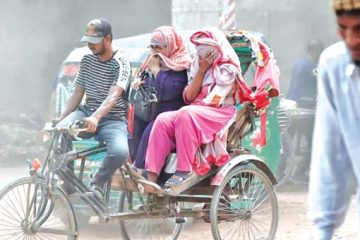Md. Shairul Mashreque
 AT the beginning of the new millennium the world has been beset by an insurmountable challenge in the wake of global recession. Economic downhill-slide in major capitalist countries in the north, which boast of having strong economies, threatens to affect countries in the south — especially the least developed countries (LDCs).
AT the beginning of the new millennium the world has been beset by an insurmountable challenge in the wake of global recession. Economic downhill-slide in major capitalist countries in the north, which boast of having strong economies, threatens to affect countries in the south — especially the least developed countries (LDCs).
The economically poor countries are now feeling the shattering impact of the domineering role of the north in open market operations. Our economy might become stagnant because of the global recession. The crisis faced by many a country in America, Europe and Asia is a “danger with a difference.”
The great apprehension of the USA-led north was the “damaging protectionist spiral” during the Great Depression in the 1930s. The recession phobia that haunts the technologically developed and prosperous industrial nations in the north may turn them into protectionists. The USA, in a subtle way, is turning the clock back to protectionism in international trade and business, as is clear in Obama’s rescue policy reflected in the “buy American”clause.
Of course, Germany and Britain oppose protectionism because they are afraid of going back to the dark days of the 1930s. There is a lurking fear that recession is growing apace to compound the relational matrix in the international arena, and will make the LDCs a losing market — receiving much less aid. In fact, these countries are in trouble as the donor countries are reducing the size of aid packages.
In the midst of global recession the state is expected to rise to the occasion and manage the acute economic crisis well ahead of time. Policy makers shaping the development of the state are taking the global recession that is about to hit our economy as a pressing issue. Even then it is difficult to predict the shape of thing to come in the future, far or near.
The global economy is now stuck in the state of depression. Many countries are beginning to feel the ravaging impacts of the global financial crisis. Deepening gloom over global economy following the disasters in Wall Street, together with the plight of major banks, add to the worries of the policy community.
There has been a good deal of thinking about the measures against recession among the members of policy communities. The advocacy role of the civil society in talk shows, seminars and policy dialogues show the intellectual activism in aid of the government. This is to ensure that assistance hits right note in pre-budgetary discourses.
Some economic observers argue that recession is less likely to affect Asian economy, partly because of its orientation towards agriculture and partly because of sound financial management systems. Even then, the Asian economy will crumble in the long run if the full blast of global recession is unleashed on the vital policy sectors. China has already declared a package of $586 billion and India $150 billion to stimulate domestic demand and market. Bangladesh has declared Tk.3,424 crore stimulus plan to tackle the global economic melt down.
The RMG sector — the major exporter — will not be in the reckoning though it has demanded a 10% cash incentive. The sector has been left to fend for itself with necessary policy support. Allocation of cash incentives with the exclusion of this sector has bred frustration among the owners. A renowned economist associated with the Centre for Policy Dialogue said that RMG has been left out for the time being; but the government will come to its aid in case of dire necessity. However, BGMEA can hope against hope as government is perhaps reviewing its decision.
The reasons for the disappointment of the garments exporters are not far to seek. The main exporting countries like China, India and Pakistan are capable of offering cheap price in the competitive market. They pursued a policy of providing cash incentives to the apparel sector in defense of their respective positions in the international market. Needless to mention, in the post MFA era, the garment sector performed well.
What is more important for the government is preventing vandalism from growing in the garment industries. The recent spate of anarchy in a garments factory is an eye opener. The state must tighten security by introducing industrial police after considering the exigencies of the circumstances. This will be in addition to legitimate policy support along with cash incentives.
In the budget discourses recession figures prominently as a priority issue. The sectors that are entitled to state support to combat recession have been marked out as priority areas. The agriculture sector has been stressed upon to ensure food security. It is based on the rationale that development of agriculture can sustain economic growth.
Banks have been asked to lend more to farmers. The government is also thinking about a stimulus package along micro- credit lines to support small and medium enterprises. Nobel laureate Dr. Muhammad Yunus said that micro-credit was an important tool for protecting many retrenched employees from the deluge of recession.
Recession may cause fall in export of manpower. This seems to be the major concern of the rescue policy in the wake of the pandemic meltdown. The government of Bangladesh has carefully designed stimulus packages. The objective is to stimulate local productive sectors to create local demands and generate employment.
The forthcoming FY-10 budget is expected to bolster the domestic economy, creating employment to accommodate the jobless labourers — including expatriates. The keynote of FY-10 budget will be a public-private partnership project (PPP). Supported by increased financial aid from ADB, PPP could provide extra strength to the rescue operation of the state with its stimulus package.
The companies or enterprises upholding corporate governance and corporate ethics deserve support. We have a class of bona fide traders who maintain business tradition and ethics, meeting the needs of consumers with “the proceeds of business according to the rules of the game.”
Those who go for profiteering, hoarding and black-marketing are practicing syndication. They should not be given any opportunities at the cost of the fixed\low income consumers. In case of policy support going their way through the chain of corruption and manipulation the vulnerable class, being the “threatened species,” will be the worst sufferers.
The grave adverse implications of the stimulus package for this class are likely to be man-made crises as dominant economic forces operating at the apex are a formidable threat to the existence of this class. What we need is smart implementation of bailout packages through good governance.
Dr. Md. Shairul Mashreque is Professor, Department of Public Administration, Chittagong University.







